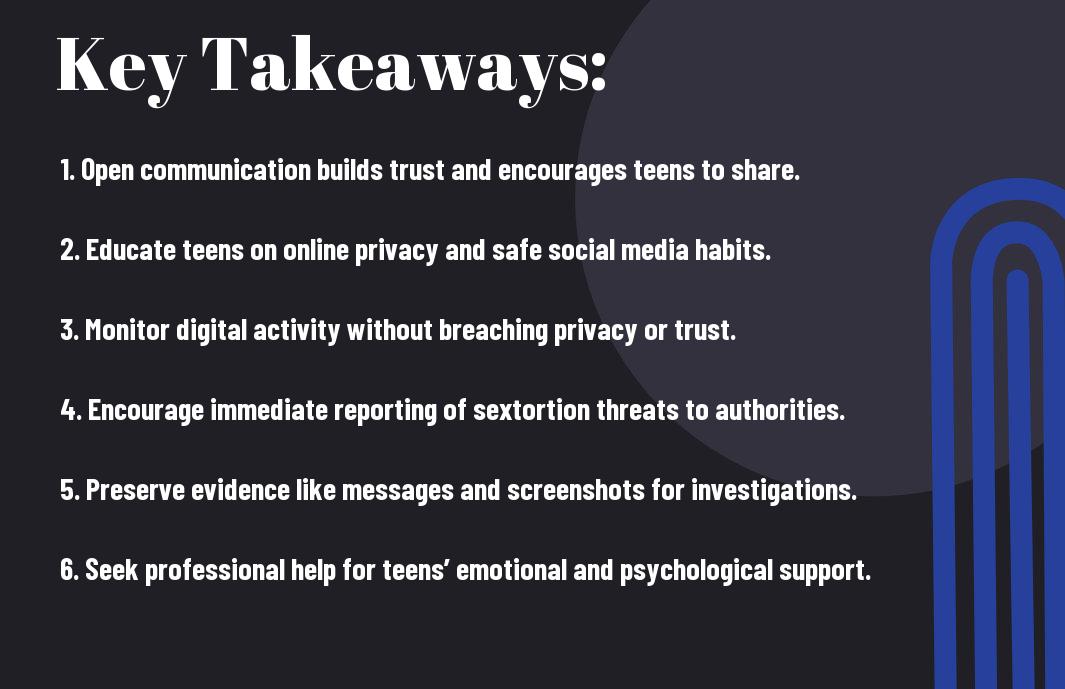Most parents are unaware that teen sextortion is an alarming trend affecting countless adolescents today. As a parent, you play a vital role in safeguarding your child from this digital threat that can lead to emotional distress and even legal consequences. This post will guide you on how to identify signs of sextortion, communicate effectively with your child, and navigate the reporting process to ensure their safety and well-being. By taking an active approach, you can significantly reduce the risks associated with this issue and empower your child to make safer decisions online. After going through this Parent’s Guide to Teen Sextortion visit Digital Forensic Squad for further assistance with reporting and defending against sextortion.
Key Takeaways:
- Educate teens about the risks of sharing personal information and images online, emphasizing the importance of privacy and digital safety.
- Establish open channels of communication with your child, encouraging them to share any uncomfortable encounters or experiences they may have online.
- Know the reporting resources available, including local authorities and online platforms, to effectively address and manage incidents of sextortion.
Understanding Teen Sextortion
Amid the digital age, teen sextortion emerges as an alarming reality, where individuals blackmail teenagers with explicit images or threats to expose them. As a parent, it’s crucial to comprehend this issue not just as a distant problem, but as a potential threat your child may face online. Equip yourself with knowledge and awareness to recognize the signs and protective measures that can safeguard your teen.
What is Sextortion?
With the rise of technology, sextortion has become an insidious form of online exploitation, where someone threatens to share intimate images or videos unless the victim meets specific demands, often involving money or further explicit content.
Signs Your Teen Might Be a Victim
By noticing changes in your teen’s behavior, you can identify potential signs of sextortion. Look out for sudden withdrawal from social interactions, secrecy about their phone or online activity, and signs of anxiety or distress surrounding technology use.
Consequently, your teen may exhibit unexplained changes in mood or a reluctance to discuss their online interactions. Other warning signs include age-inappropriate online engagement, such as spending excessive time on certain apps, or expressing fears about their images being shared. Being vigilant and opening a dialogue can empower you to provide the support your teen needs, reinforcing that they can trust you to help them navigate this sensitive area.

The Role of Parents
Some parents are unaware of the risks their teens face online. It’s vital for you to take an active role in understanding the digital landscape where your child interacts. By being supportive and vigilant, you can provide the necessary guidance and resources to help them navigate potential dangers like sextortion.
Building Open Communication
One of the most effective ways to combat sextortion is by fostering open communication with your teen. Encourage them to share their online experiences with you, ensuring they feel safe discussing any uncomfortable situations they encounter. This trust will make it easier for them to reach out if they ever find themselves in a crisis.
Educating About Online Safety
Beside establishing communication, it’s important to educate your teen about online safety. Provide them with the knowledge and skills necessary to recognize dangerous situations and understand the importance of protecting their personal information.
At the core of educating about online safety is understanding the variety of threats that exist in the digital world. Teach your teen that sharing intimate images can lead to manipulation and coercion. Explain the risks of engaging with strangers online, as cybercriminals often pose as friends to gain trust. Equip your child with tools to adjust privacy settings on social media platforms, and emphasize the importance of reporting any suspicious behavior. Engaging in conversations about consent and the impact of sharing personal content will empower your teen to make safe choices online.

Immediate Steps to Take
Not addressing the situation right away puts your teen at greater risk. Start by ensuring their safety and emotional well-being. Encourage them to talk openly about their experiences and feelings, while also letting them know they are not at fault. It is vital to act quickly to mitigate the consequences of the sextortion tactic being used against them.
Documenting Evidence
Among the first actions you should take is to collect any evidence related to the sextortion. This includes screenshots of messages, emails, and any other relevant communications your teen has received. Ensure that you preserve these items without deleting or altering anything, as they may be instrumental for authorities in addressing the case.
Contacting Authorities
Immediate action includes reporting the situation to local law enforcement and relevant cybercrime units. They are equipped to handle cases of sextortion and can provide guidance on next steps. Within this process, it’s important to convey all details clearly, as this will help in the investigation.
Considering the serious nature of sextortion, contacting authorities promptly is vital for both the safety of your teen and the potential apprehension of the perpetrator. Law enforcement agencies can offer not only guidance but also protective measures against further victimization. Additionally, they can help you understand the legal options available, which can be critical in safeguarding your teen’s future. Always keep your teen informed about the process, reinforcing their role in overcoming this challenge, empowering them in a difficult situation.
Resources for Support
To ensure your teenager receives the necessary help and guidance, it is vital to be aware of available resources. Various organizations provide support, counseling, and reporting platforms specifically tailored to address sextortion cases. Engaging with these resources can empower you and your child to navigate this crisis effectively.
Counseling Options
With the emotional toll that sextortion can have on your teenager, seeking professional counseling is vital. Many therapists specialize in online exploitation and can provide a safe space for your child to process their feelings, develop coping strategies, and regain a sense of control over their life.
Reporting Platforms
Along with counseling, knowing how to report sextortion cases can significantly aid in protecting your child. Numerous platforms, such as the National Center for Missing and Exploited Children (NCMEC) and CyberTipline, allow you to anonymously report exploitation incidents. Additionally, local law enforcement agencies often have procedures for handling these cases. It is vital to act swiftly, as early reporting can help prevent further victimization and potentially lead to legal action against the perpetrator.
Consequently, utilizing these reporting platforms can provide a structured approach to addressing the threat. Many of these organizations not only accept reports but also offer subsequent support and guidance. Engaging with these services can lead to increased awareness of the issue and contribute to ongoing efforts to combat sextortion on a larger scale. By taking this proactive step, you not only protect your own child but also support the broader community in addressing this significant threat.
Preventative Measures
Unlike many challenges your teen faces, sextortion can be mitigated with proactive approaches. By engaging in open conversations about online safety and creating a supportive home environment, you can equip your child with the tools they need to navigate the digital world safely. Being aware of the signs and having consistent check-ins with your teenager can significantly decrease their vulnerability to online predators.
Online Privacy Settings
At the heart of protecting your child from sextortion is understanding how to implement strict online privacy settings. Encourage your teen to use the highest privacy levels on social media platforms, limit who can view their profiles, and be cautious about sharing personal information. This proactive approach helps in creating a safer online presence for your child.
Encouraging Healthy Relationships
To foster resilience against sextortion, you should encourage your teen to build healthy relationships with peers. Open dialogue about friendships, trust, and respect will empower them to identify red flags in their interactions. Ensure that they feel comfortable discussing their online experiences with you, reinforcing the idea that personal safety is always a priority.
Indeed, fostering healthy relationships is more than just a protective measure; it shapes your teenager’s emotional well-being. By promoting trust and communication, you help your child understand the importance of setting boundaries. Encourage them to engage only with people who respect their feelings and decisions. When they feel supported, teens are less likely to fall victim to those who may seek to manipulate or exploit them. Regular discussions around their relationships and potential pressures they face online ensure your teen knows they can turn to you in times of need.
Long-term Strategies
Once again, addressing teen sextortion requires you to adopt long-term strategies that foster resilience and awareness in your child. By focusing on education and proactive measures, you can equip your teen with the tools to navigate the digital landscape safely, thus reducing their vulnerability to exploitation. It’s vital to remain vigilant and supportive as the digital world continues to evolve.
Ongoing Conversations with Teens
Before submerging into sensitive topics, establish an open line of communication with your teen. Engage them in discussions about their online experiences, ensuring they feel comfortable sharing their thoughts and concerns. Regularly asking about their social media interactions can help you identify any potentially harmful situations early on.
Creating a Supportive Environment
Conversations about online safety thrive in a supportive environment. You should strive to create a space where your teen feels valued and understood. This means actively listening to their feelings and experiences without judgment, fostering trust. Assure them that they can always turn to you in times of distress, which allows them to navigate challenges more confidently.
For instance, it’s important to recognize that adolescents often face immense pressure from their peers and the digital world. By validating your teen’s emotions and experiences, you can help them feel more secure and less isolated when encountering issues like sextortion. Engaging in family activities that promote interaction can also make your home a safe haven. When they know they have your backing, they will be more likely to reach out for help when they encounter troubling situations online.
To wrap up
Hence, as a parent, staying informed about teen sextortion is vital for your child’s safety and well-being. By keeping an open line of communication with your children and being proactive in discussions surrounding online risks, you can help them navigate these challenges. Should a situation arise, know that you can take appropriate steps to report and handle the crisis effectively.
FAQ
Q: How can parents effectively support their teens if they disclose a sextortion incident?
A: If your teen discloses a sextortion incident, it’s vital to approach the situation with empathy and understanding. Reassure your child that they are not alone and that you are there to support them. Avoid blaming or shaming them, as this may exacerbate their feelings of shame or guilt. Encourage them to talk about their experiences, and help them document any evidence related to the incident, such as screenshots or messages. Additionally, consider involving professionals or local authorities who specialize in cybercrime to ensure the situation is handled appropriately.
Q: What steps can parents take to prevent sextortion before it becomes a problem?
A: Preventing sextortion involves proactive measures. Educate your teens about the dangers of sharing personal information and sexual content online. Establish open dialogue about online interactions, teaching them to think critically about their digital footprints. Employ parental controls and monitoring software to keep track of your child’s online activities and the platforms they are using. Encourage your teen to come to you with any uncomfortable situations they encounter online and reinforce the importance of trusting their instincts. Fostering a secure and trusting environment will empower them to communicate openly about their online experiences.
Resources:
1. These teenage boys were blackmailed online – and it cost them their lives
2. Financial sextortion most often targets teen boys via Instagram, according to new data
3. Our teenage son was targeted by a sextortionist online – here’s what we did

